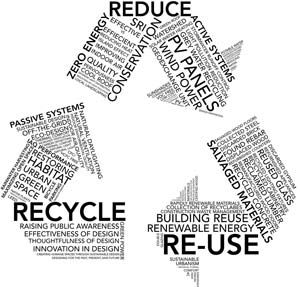
triple bottom line (a.k.a. people, planet, profit): accounting that goes beyond revenue to factor in social and environmental costs
feebate: surcharge on wasteful products, plus incentive for alternatives. Example: Starting in 2011, California’s Clean Car Discount program will slap up to $2,500 onto the price of gas-guzzlers, and fund cash rewards for fuel-efficient vehicles.
dinosaur wine: petroleum
energy return on investment: the ratio of energy provided to the energy used to produce the fuel. Corn ethanol has an eroi of 1.5:1; sugarcane ethanol’s is 8:1.
lohas: Lifestyles of Health and Sustainability; marketing jargon for ecoconscious consumers, an estimated 1 in 5 adult Americans
basic browns: the anti-lohas crowd, now dubbed “apathetics”
light/dark/bright green: Light greens focus on lifestyle changes; dark greens focus on macro policy shifts; bright greens want to overhaul everything.
conspicuous conservation: $109K electric Tesla Roadster; Whole Foods’ $50 organic cotton T-shirt. Related: checkbook environmentalism.
practicavore: grows own food to save money
food desert: area devoid of fresh food, flush with liquor stores
walkshed: area conveniently reached on foot from your house
slow design: think slow food
freedom lawn: native plants and grasses
cradle-to-cradle: reuse or recycling of everything used to make a product
upcycling: sewing old T-shirts into area rugs
biomimicry: imitating natural designs to improve efficiency, e.g. finding way to store vaccines without refrigeration by studying how plants hibernate
















